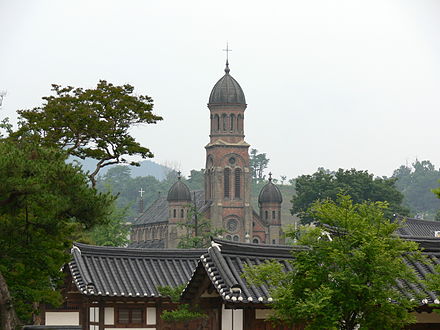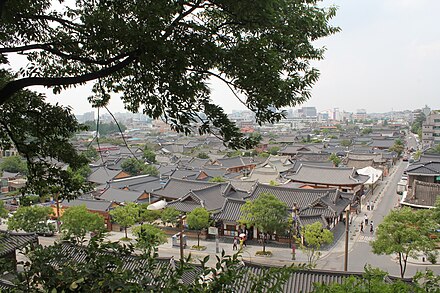Jeonju - capital of North Jeolla Province, South Korea
Jeonju (전주, 全州) is the capital of North Jeolla province, South Korea.
Understand
Jeonju has been a central city in the Jeolla region for centuries. It was regarded as the birthplace of the Joseon dynasty, as the royal family clan was from Jeonju.
Jeonju has many traditional architectures and heritages, and even the expressway tollgate is in shape of hanok.
Get in
By train
KTX trains to Jeonju Station from Seoul depart from Yongsan Station, with some departing from Seoul Station. This is the fastest but most expensive option, taking about 2 hours from Seoul. Basic KTX fare from Seoul to Jeonju is ₩29,400 (2023).
Reaching Jeonju by train from the Gyeongsang region (Busan, Gyeongju, Changwon) require a detour and a transfer usually at Osong Station.
By bus
The Express Bus Terminal (고속버스터미널) and Intercity Bus Terminal (시외버스터미널) are right next to each other.
From Seoul, express buses departing from Central City Terminal are available for as little as ₩6,900 (child) ₩13,800 (adult) and take 2 hours and 40 minutes. From Incheon Airport, there are limousine buses that run every half hour that will take you near city hall in Jeonju. It takes 3 hours and 30 minutes. From Busan, express buses leave approximately every hour and cost ₩24,900. The trip takes around 3 hours.
Every bus trip makes at least one rest stop during the journey for about 15 minutes at a rest area where you can grab a bite or use the restroom.
Get around
By bus
There's an excellent public bus system that costs ₩1,300. All buses have free wifi. Line 1000, with a trolleybus livery, is designed for tourists and connects the train station and bus terminals to the hotel district and hanok village.
By taxi
Meter drop for taxis is ₩2,800. From the station to Hanok Maeul (Hanok Village) it's about ₩5,500.
By foot
Due to its relatively small size the main tourist spots can be fairly well seen by foot; sights like Deokjin Park, Wolseon Park and the city centre are not that far from each other.
By bike
Kakao T Bike, a shared electric bike service, is available in most of the city. There are no designated stations so the bikes can be left wherever as long as they are locked and accessible. ₩1,130 for the first 15 minutes and ₩500 for each 5 minutes after.
See

- DeokJin Park (덕진공원), 35.847509°, 127.121757°. You can see the bridge on the pond and Changpo herbs (창포) and you can take a duck boat. At night you can also see the music fountail and beautiful lights on bridge. At the middle of bridge there's a cafe and a convenience store.
- Gaeksa Building (객사). This building was built around 1471 and was used to accommodate important visitors. Rituals to honour the king were also held here. It's a meeting place for many as well as a hangout location for many old men. The downtown area surrounding is also referred to as Gaeksa.
- Hansol Paper Museum. Records the history of paper making and usages since the age of the Egyptians. There is an interesting movie shown in English upon request. Most of the signs are in Korean only, but the museum is still quite interesting. There are some displays on traditional Korean paper making. You also have a chance to make a piece of paper there as well. On weekends and holidays, there are various workshops available.
- Jeonju Hanok Village (전주한옥마을), 35.815151°, 127.153873°. This traditional village is comprised of over 800 Hanok. Most of the Hanok were constructed in Joseon period (1392-1910). Here you can experience a variety of traditional Korean culture such as making traditional Korean paper (Hanji) or trying Korean liquor. 2023-03-11
- Jeonju Natural Ecology Museum, 35.811231°, 127.162939°, +82 063-281-2831. A plant and wildlife museum perfect for children.
- Jeonju Traditional Wine Museum (전주 전통술박물관), 71 Hanji-gil, Wansan-gu, +82-63-287-6305. 9AM-6PM, closed Mondays. Opened in the Hanok Village in 2002, this museum aims to promote Korea's tradition of home brewing. Besides displays, there are classes and hands-on programs. They are reportedly eager to assist anyone wishing to brew Korea's traditional drinks for themselves. There are small fees for the programs: interestingly, teens get a discount on the "Local Wine-Drinking Rituals" class! 2015-05-11
- Ohmockdae (오목대). A small hill with a traditional house on top. The best thing about this spot is the night view of the city.
- Jeondong Cathedral, 51 Taejo-ro, Wansan-gu (5 min. walk from Nambu Market bus stop or Jeondong Cathedral-Hanok Village Bus stop. Right next to Hanok Village.), 35.813492°, 127.149055°. This mix of Romanesque and Byzantine style cathedral was constructed in 1914, and is in the same place where many Christians were martyred. 2021-02-22
Do
Watch the local football team Jeonbuk Hyundai Motors FC at the Jeonju World Cup Stadium 📍. They are one of the most successful in Korea(8-time K League Winner) and have won the AFC Champions League twice.
Eat
 Jeonju is famous for its cuisine. Bibimbap is one of the most famous Korean dishes native to this region. "Bibim" means mixed and "bap" means rice. Served in the traditional brassware, it consists of rice with seasonal stir fried vegetables (carrot, bean sprout, radish, spinach, zucchini, bracken), seaweed (gim), and hot pepper paste (gochujang). It is also available in a hot stone bowl (dol sot), which slowly cooks the egg as you stir the ingredients together. The characteristic thing about Jeonju bibimbap is that it comes with Korean beef tartar (Yukhoe), Hwang Po Mook (a yellow jelly made from mung beans) and raw egg yolk (most of other regions in Korea serve with fried egg). The price for a serving of bibimbap is about ₩10,000. Along with bibimbap, kongnamul gukbap (bean sprout soup with rice) is one of the most popular food in Jeonju. Also give mountain vegetable (san chae) bibimbap a taste, if you're at any of the local mountains.
Jeonju is famous for its cuisine. Bibimbap is one of the most famous Korean dishes native to this region. "Bibim" means mixed and "bap" means rice. Served in the traditional brassware, it consists of rice with seasonal stir fried vegetables (carrot, bean sprout, radish, spinach, zucchini, bracken), seaweed (gim), and hot pepper paste (gochujang). It is also available in a hot stone bowl (dol sot), which slowly cooks the egg as you stir the ingredients together. The characteristic thing about Jeonju bibimbap is that it comes with Korean beef tartar (Yukhoe), Hwang Po Mook (a yellow jelly made from mung beans) and raw egg yolk (most of other regions in Korea serve with fried egg). The price for a serving of bibimbap is about ₩10,000. Along with bibimbap, kongnamul gukbap (bean sprout soup with rice) is one of the most popular food in Jeonju. Also give mountain vegetable (san chae) bibimbap a taste, if you're at any of the local mountains.
Some famous Bibimbap restaurants include:
- Ga Jok Hoe Gwan (가족회관), 35.817082°, 127.146052°, +82 063-284-0982. 11:30AM-9:30PM.
- Loving Hut (러빙헛), Seosin Store 295-24, Seosin-Dong, Wansan-Gu, 35.82743°, 127.120338°, +82 063-274-7025.
- Veteran (베테랑), 84-10, Gyo-dong, Wansan-gu (From the SE corner of Gyeonggijeon, go half a block south. The building is metallic gray and on the east side of the road.), 35.813411°, 127.151561°, +82 63-285-9898. A noodle restaurant with a limited but worthwhile menu. It is always busy.
- Taste of bumpkin (촌놈의 손맛), 23, Taejo-ro, Wansan-gu, 35.8145086°, 127.1521601°, +82 063-535-5555. It sells meatballs on a stick. Meatballs is made grilled Short Rib Patties. meatballs on a stick: 3,500won
- Gyodong croquette (교동고로케), 126, Gyeonggijeon-gil, Wansan-gu, 35.8138303°, 127.1511184°, +82 063-283-5555. It is a croquette store. It serves many different types of croquette. Cream cheese croquette: 2,500won, Jeonju bibimbap croquette: 2,500won, Potato croquette: 2,000won
- Daurang (다우랑), 33, Taejo-ro, Wansan-gu, 35.8142384°, 127.1510449°, +82 063-285-5000. It is a dumpling store. It serves many different types of dumpling. Shrimp pan-fried dumpling is one of the most popular food in this store. Shrimp pan-fried dumplings: 1ea-2,000won/1package-8,000won, Shrimp dumplings: 1package-5,000won, King-sized Dumplings: 1,500won, Pan-fried dumplings: 1,500won
- two aunts(Duimo) (두이모), 21, Jamandong 2-gil, Wansan-gu, 35.8142216°, 127.156744°, +82 063-274-1212. This café is famous for a bibimbap waffle. And it serves various homemade juices.
- Jeondong Korean pancake (전동호떡), 75, Eunhaeng-ro, Wansan-gu, 35.8133357°, 127.1529474°, +82 063-232-3778. It serves Korean pancake that is baked in a firepot. Korean pancake is chewy and mild. Soybean milk honey Korean pancake: 2,000won, Cream cheese Korean pancake: 2,500won, Garlic Korean pancake: 2,500won, Ice cream Korean pancake: 3,500won
Jeonju-style Bean Sprout and Rice Soup Jeonju is known for its delicious food. Bean sprout and rice soup is called 'kong na mul kuk bap'. Various ingredients make delicious kongnamulkukbap. Bean sprouts are a basic ingredient for this. Jeonju-style bean sprout and rice soup is used a specially-made seasoning in food.
Watery black-bean-sauce noodles (Muljjajang-myeon) Jeonju has had special jjajang-myeon. Original jjajang-myeon is dry and savoury, on the other hand muljjajang-myeon is something spicy and watery. It had transparent soup in the old days, but now it become reddish and spicy soup as per Jeonju people's taste.
Homemade chocolate pie This chocolate pie is different to other chocolate pies. It is much bigger and sweeter than others. Also there is no marshmallow. It is popular all over the country including Jeonju.
Drink
Jeonju contains some areas for going out for drinks. The area by Jeonbuk National university, referred to by students as the Old Gate, is full of bars, restaurants, and Korean-style pochas catering to those in their 20s.
Another popular zone is Sinsigaji located in front of the provincial government building. This area is relatively new and has more variety of restaurants, bars, and clubs than the Old Gate. This area caters to university students and older audiences as well.
Foreign bars in Jeonju include J.R.'s Saloon, Deepin, Art & Travel, Tombstone and Mad Hungry.
Crude liquor (Moju) Crude liquor is an alcohol used as a hangover-chaser. It is made from makgeolli which mixed 8 medicinal herbs. Medicinal herbs are ginger, jujube, cinnamon, pear, etc.
Sleep
- Jeonju Guesthouse, 62, Gyeongwon-dong 2ga, Wansan-gu (Beside the east entrance of Kyoung-Ki-Jeon. Follow the wall and it is at the end of the wall.), 35.81718°, 127.1504°, +82 63-286-8886, +82 17-661-3929. Check-in: Anytime, check-out: Anytime. B&B with dormitory beds, a cafeteria, a kitchen, a rooftop area for barbecues, and free internet. The staff speaks English. M-F ₩17,000, Sa-Su ₩19,000
Hanok village stays
Traditional Korean traditional house accommodation.
- {{sleep | name=Jjhanok | alt=이음전주한옥생활체험관분사무소 | url=http://www.jjhanok.com/english (dead link: December 2020) | email= | address= | lat=35.817574 | long=127.15309 | directions= | phone=+82 63-287-6300 | tollfree= | fax= | price= | checkin= | checkout= | content= }}
- Hankindang. Web page available only in Korean, reservations by phone or e-mail.
- JK Hankok, 35.8168°, 127.152768°, +82 063-285-3490. Web page available only in Korean, reservations by phone.
Connect
Just like in the rest of Korea, internet cafes, known as PC Bang (look for signs showing PC방) are plentiful in Jeonju, these provide high speed internet access and modern desktop usage for around ₩1,000 an hour.
Go next
Buses regularly leave for Busan and other cities. The intercity and express bus terminal are very close to each other on the river.
North Jeolla
Primary administrative division
